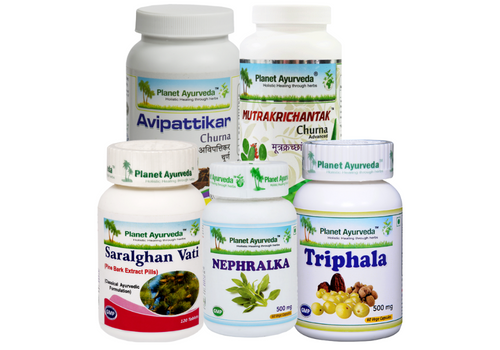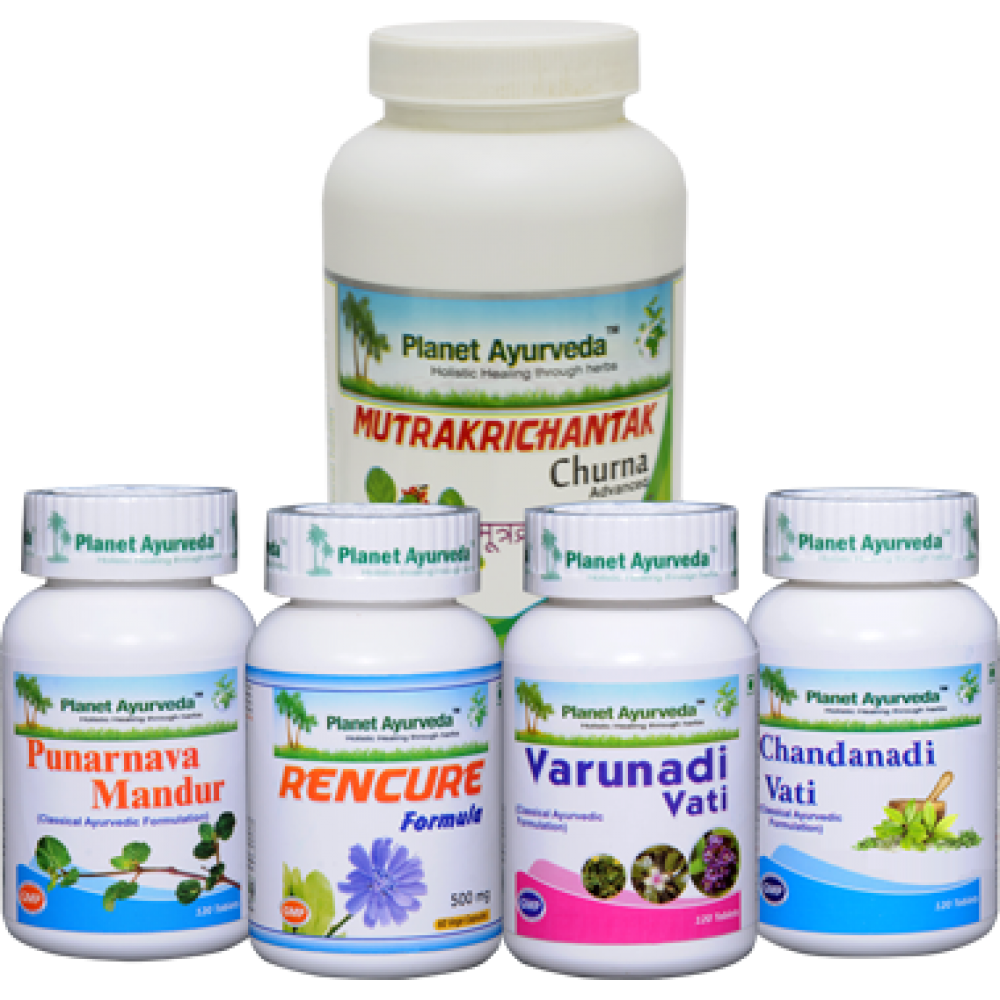Encapsulating Peritoneal Sclerosis Treatment In Ayurveda

Abstract
Peritoneal dialysis is a treatment for kidney failure patients that filters your blood. It collects waste from the body’s blood by washing the peritoneal cavity (empty space in the abdomen). This exchange process is performed daily on a routine basis and the peritoneal dialysis solutions undergo heat sterilization processes which form glucose degradation products. Thus it can involve various complications. One of its complications is Encapsulating Peritoneal Sclerosis. Yet, there are some causes of the occurrence of EPS that are not linked to peritoneal dialysis. In this article we will discuss the Encapsulating Peritoneal Sclerosis disorder and what we can do to manage it with natural methods- ‘Ayurveda’.
Introduction
Encapsulating Peritoneal Sclerosis is a rare complication of peritoneal dialysis that is defined as intraperitoneal inflammation and fibrosis. This rare disorder is associated with long-term peritoneal dialysis that results in excessive thickening of peritoneum along with its fibrosis, resulting in the formation of a fibrous cocoon encapsulation. Yet, recovery is possible if it is diagnosed and managed on time. Studies show that the Majority of patients (50-80%) on peritoneal dialysis will experience Encapsulating Peritoneal Sclerosis within two years of the initiation. Encapsulating Peritoneal Sclerosis is a benign cause of small bowel obstruction, and if not treated will lead to the formation of cocoon syndrome in chronic cases. Before Encapsulating Peritoneal Sclerosis was termed abdominal cocoon syndrome but later it was differentiated that Encapsulating Peritoneal Sclerosis in its untreated chronic stage leads to cocoon syndrome. Encapsulating Peritoneal Sclerosis is also known as sclerosing peritonitis, encapsulating peritonitis, and peritonitis chronic fibrosa incapsulata.
Ayurvedic aspect
Encapsulating Peritoneal Sclerosis is not exactly correlated with any disease in Ayurveda because peritoneal dialysis is a modern pathy method to pure blood, while Ayurveda provides various therapies and natural drugs for blood purification. The drugs and treatment described for “Udar vikar” can be implemented according to the patient’s symptoms. Also, the patient is recovered to the extent that they may not need the use of dialysis further. Ayurveda is very vast and successful in managing these disorders. Ayurvedic medicines can revive normal kidney functioning very effectively, that can even prevent the need for dialysis. Details of medicines are given further in the article.
Causes
- Encapsulating Peritoneal Sclerosis occurs by a fibrotic membrane covering the small bowel.
- Fibrin deposition around parts of the small bowel during peritoneal dialysis.
- High glucose within dialysis
- Ultrafiltration failure
- Also, some causes that are not directly related to peritoneal dialysis are-
- Autoimmune disorders
- Intra-abdominal malignancies
- Intraperitoneal chemotherapy
- Peritoneal ascites
- Sarcoidosis
- Peritonitis
- Bioincompatible dialysis
- Endometriosis
- Abdominal surgery
- Renal transplantation
Symptoms
Symptoms of Encapsulating Peritoneal Sclerosis include-
- Abdominal pain
- Abdominal obstruction
- Nausea
- Vomiting
- Early satiety
- Weight loss
- Altered bowel habits
- Ascites
Diagnosis
Diagnosis is made based on the symptoms and some diagnostic tests-
- Blood tests
- CT scan
- Abdominal radiography
- Laparoscopy
Treatment
Treatment initially involves the cessation of peritoneal dialysis and patients are recommended for hemodialysis.
- Removal of peritoneal dialysis catheter
- Corticosteroids
- Anti-inflammatory drugs
- Surgery- The risk of surgery includes sepsis, perforation of intestines, fistula formation, and may even cause death.
Herbal remedies for Encapsulating Peritoneal Sclerosis by Planet Ayurveda
Planet Ayurveda is a GMP-certified Ayurvedic company that prepares natural medicines by using authentic ways. The herbal medicines prepared by the company are prescribed in many body disabilities and diseases. These medicines are 100% pure and are completely herbal with no side effects. Also while formulating these remedies, our MD experts take care of adding any sort of resin, color, or chemical. The preparation of medicines strictly follows Ayurvedic principles along with government guidelines.
Many herbal medicines of Planet Ayurveda are used in the treatment of Encapsulating Peritoneal Sclerosis, which has wonderful results and is doing great in managing the condition –
Products List
- Mutrakrichantak Churna
- Nephralka Capsules
- Avipattikar Chruna
- Saralghan Vati
- Triphala Capsules
Products Description
1. Mutrakrichantak Churna
This herbal medicine is prepared with Varun (Crateva nurvala), Bhumiamla (Phyllanthus niruri), Gokshur (Tribulus terrestris), Kalmegh (Andrographis paniculata), etc. It is useful in kidney diseases, stones, urinary problems, infections, dialysis, kidney failure, and many other diseases. It acts as a diuretic and eliminates toxins from the body while providing nutrition to the body. It is indicated in acute and chronic kidney failure and has shown wonderful results.
Dosage– Take 1 teaspoon of churna twice daily.
2. Nephralka Capsules
These capsules are prepared from Bhumiamla (Phyllanthus niruri), Punarnava (Boerhavia diffusa), Kalmegh (Andrographis paniculata), etc. These capsules balance the tridosha and maintain overall kidney health. It helps to recover kidney functioning to its near normal that it may not need further dialysis.
Dosage- Take 1 capsule twice daily.
3. Avipattikar Chruna
This classical formulation is made with a combination of herbs like – Baheda (Terminalia bellirica), Peepal (Ficus religiosa), Amla (Emblica officinalis), Vidanga (Embelia ribes), Tejpatta (Laurus nobilis), Green cardamom (Elettaria cardamomum), Nisoth (Operculina turpethum), etc. This herbal mixture is mostly used to balance Pitta dosha in the body. It acts as a strong antacid and also maintains normal acid production in the body.
Dosage- Take a half teaspoon twice daily with water.
4. Saralghan Vati
This is an ayurvedic preparation that contains Saral (Pinus roxburghii). It supports the healthy functioning of the kidneys. The tablets also maintain normal blood pressure, production of red blood cells, and regulate electrolyte imbalance. It maintains the normal functioning of the kidneys thus preventing renal failure.
Dosage– Take 2 tablets twice daily
5. Triphala Capsules
These capsules are prepared from Haritki (Terminalia chebula), Vibhitki (Terminalia bellerica), Amalaki (Emblica officinalis), and shuddh guggul (Commiphora mukul). They pacify the Kapha dosha and help to maintain overall metabolism. It heals anal fissures, anal fistula, and other anal problems by preventing constipation. It detoxifies the body by excreting waste products through urine. This helps in the easy and normal functioning of the kidneys.
Dosage- Take 1 capsule twice daily.
Contact Planet Ayurveda Support Team to provide you the costing / ordering and delivery information at – costing.planetayurveda@gmail.com or Call at 0172-521-4040 (India), +91-172-521-4040 (Outside India) or Whatsapp at (+91) 9915-593-604
Conclusion
Ayurvedic medicine is the oldest and most natural healing system with herbs. Ayurveda medicine differs in all aspects and can have wonderful results that have been proved in many cases, also without any side effects. Herbal medicines offer the opportunity to understand the nature of the disorder and treat it accordingly for the best results. For any queries visit us at www.planetayurveda.com






